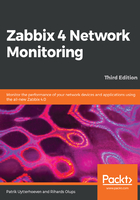
Item types
As explored previously, Zabbix gathers all its data within items. But surely, we'll want to get information in more ways than just through the Zabbix agent. What are our options? Let's have a look:

This is the item type configuration drop-down that opens when editing an item. We pretty much skipped this selection when creating our item, because the default value suited us. Let's take a quick look at the types available now:
- Zabbix agent: This is the default type. The server connects to the agent and gathers data.
- Zabbix agent (active): This can be considered the opposite of the previous type. The Zabbix agent gathers data and connects to the server as required.
- Simple check: As the name implies, this type groups simple checks that are performed by the server. This includes checking for open TCP ports, ICMP ping, VMware, and so on. We will discuss both Zabbix agent types and simple checks in Chapter 3, Monitoring with Zabbix Agents and Basic Protocols.
- SNMP agents: These three types deal with gathering SNMP data. Versions, obviously, denote the protocol version to use when connecting to the monitored host.
- SNMP trap: While still relying on Net-SNMP's snmptrapd to obtain traps from the network, Zabbix offers the functionality of receiving SNMP traps easily. This item type allows you to do that, including automatic sorting per host. We will cover SNMP polling and trapping in Chapter 4, Monitoring SNMP Devices.
- Zabbix internal: This groups items that gather information about the internal state of Zabbix. We will discuss internal monitoring in Chapter 3, Monitoring with Zabbix Agents and Basic Protocols.
- Zabbix trapper: This item type accepts incoming data instead of querying for it. It is useful for any data you might want to feed into Zabbix that is obtained using other tools, customs scripts, or any other method.
- Zabbix aggregate: These items aggregate values across a host group. This is mostly useful for clusters or server farms where the overall state is more important than the state of individual machines.
- External check: External checks allow the Zabbix server to execute external commands and store the returned values in the item. This allows it to pass along any information that isn't accessible using any of the other item types. We will use Zabbix trapper items, aggregate items, and external checks in Chapter 10, Advanced Item Monitoring.
- Database monitor: This type includes checks by using the unixODBC drivers from the OS for querying various database parameters.
- HTTP Agent: This type of item allows us to poll data from a web page by making use of the HTTP/HTTPS protocol. Imagine Zabbix being able to connect to a website, read data from that website, and place it in an item. It sounds basic but we can do much more advanced things, such as converting headers to JSON or reading data in XML or JSON.
- IPMI agent: The Intelligent Platform Management Interface (IPMI) is a specification for managing and monitoring (which we're mostly after) systems, especially for out-of-band solutions. The IPMI item type allows direct access to this data. We will cover IPMI monitoring in Chapter 14, Monitoring IPMI Devices.
- SSH agent: It is possible to directly query a host with SSH and retrieve shell-command output. This check supports both password and key-based authentication.
- TELNET agent: For some systems where SSH is unavailable, a Telnet check can be used. While insecure, it might be the only way to access some devices, including older generation switches or UPSes. We will discuss SSH and Telnet -items in Chapter 10, Advanced Item Monitoring.
- JMX agent: Zabbix provides a component called the Zabbix Java gateway. It allows you to monitor JMX-capable applications directly. JMX monitoring will be discussed in Chapter 15, Monitoring Java Applications.
- Calculated: These are advanced items that allow you to create new values from other, pre-existing Zabbix items without duplicating data retrieval. We will use these items in Chapter 10, Advanced Item Monitoring.
- Dependent Item: Sometimes, it makes sense to gather data in bulk, and at other times there is no other way then to retrieve data in bulk. The dependent item can be used to retrieve necessary data out of the master item that contains the bulk data.
While all of these types might look a bit confusing at this point, an important thing to remember is that they are available for your use, but you don't have to use them. You can have a host with a single ICMP ping item, but if you want to monitor more, the advanced functionality will always be there.
As you might have noticed, the item type is set per individual item, not per host. This allows for great flexibility when setting up monitored hosts. For example, you can use ICMP to check general availability, a Zabbix agent to check the status of some services and simple TCP checks for others, a trapper to receive custom data, and IPMI to monitor parameters through the management adapter-all on the same host. The choice of item type will depend on network connectivity, the feature set of the monitored host, and the ease of implementation. Zabbix will allow you to choose the best fit for each item.